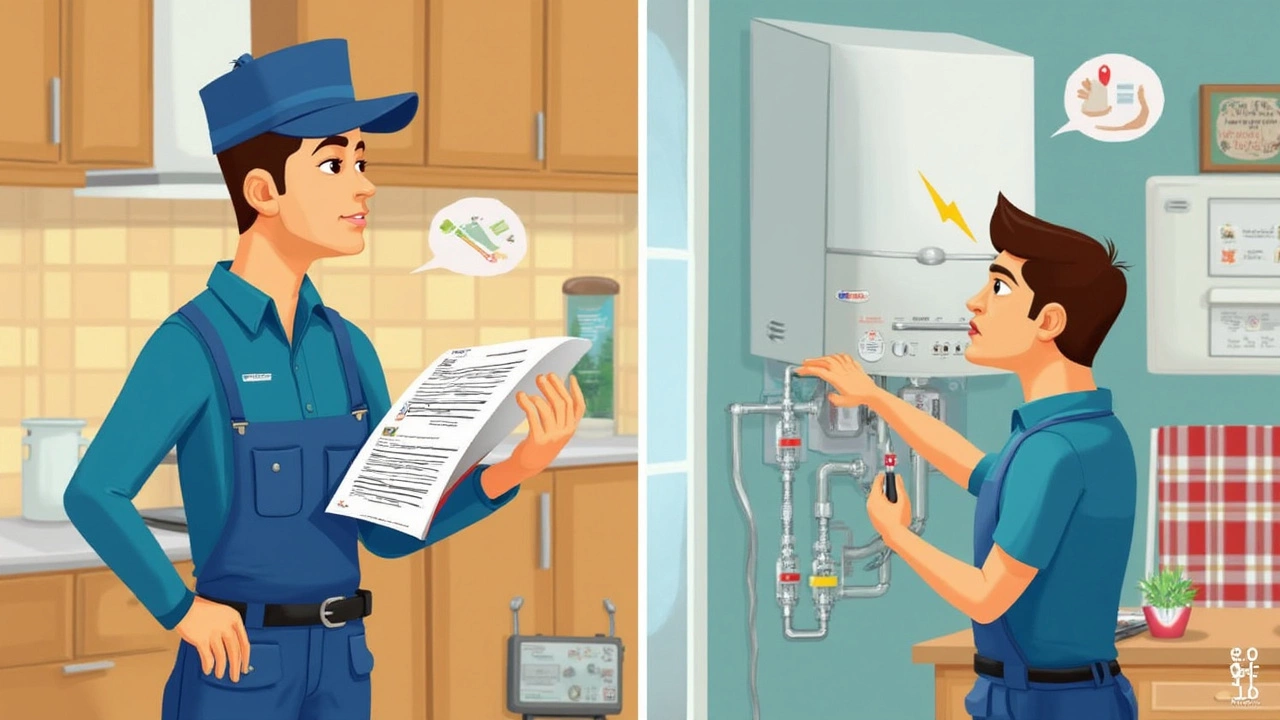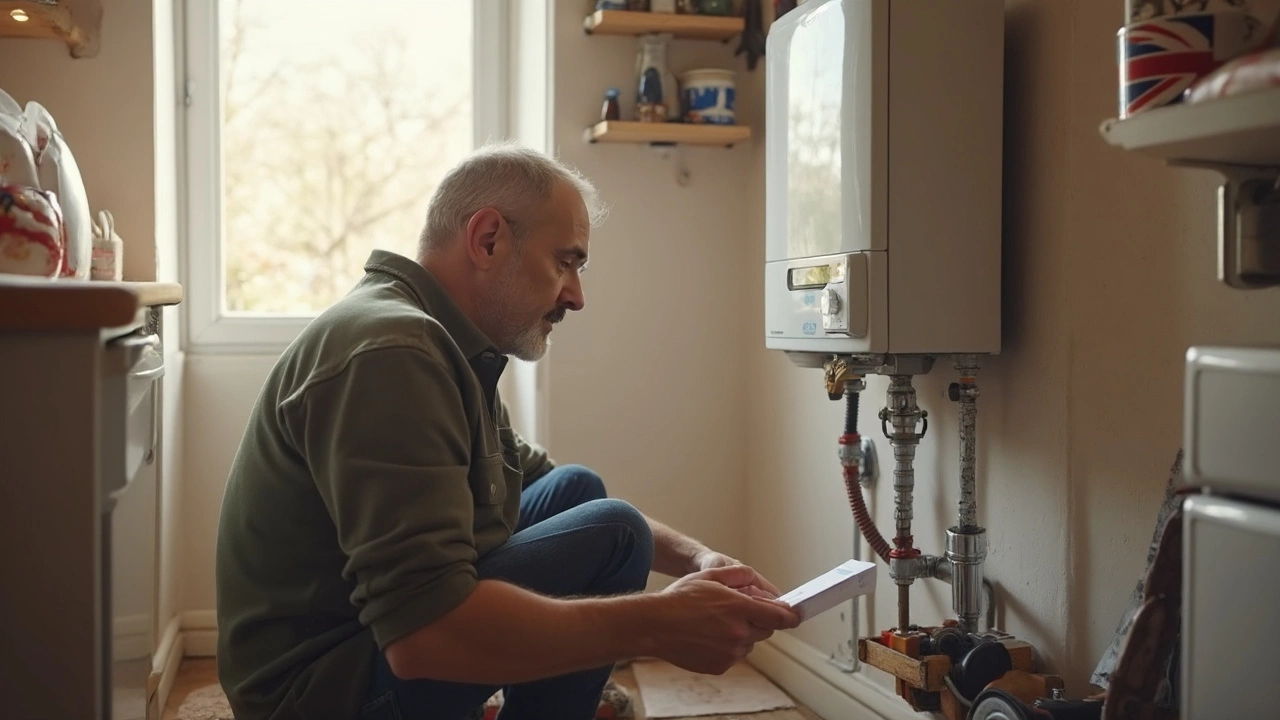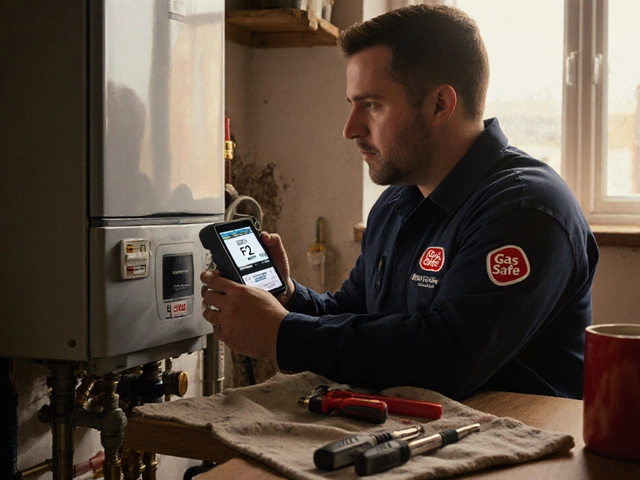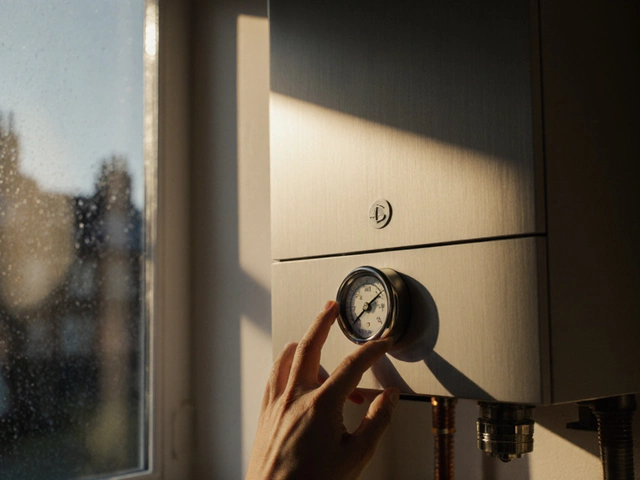Ever stared at your noisy old boiler and wondered if you could handle its maintenance yourself? You’re definitely not alone. Loads of people want to save cash or skip the hassle of booking a pro. But before you grab your tools, there’s stuff you’ve got to know or things can get ugly fast, not just for your heating, but for your whole house and even your health.
The truth? While some simple jobs are safe and can save you money, most boiler servicing comes with a load of rules—and for good reason. Boilers aren’t just big kettles. You’re dealing with gas, pressure, and things that, if messed up, can lead to carbon monoxide leaks or even explosions. It’s not just about keeping warm; it could be about keeping everyone in your home alive and well.
So, what’s actually safe for a regular person to do, and where do you absolutely need a Gas Safe engineer? Stick around because I’ll break down the exact line where DIY ends and where you need someone who knows their stuff. Plus, I’ve got actionable tips that’ll help you get the most out of your heating system—without risking your safety or breaking the law.
- What Does Boiler Servicing Really Mean?
- DIY Boiler Maintenance: What’s Actually Safe?
- Legal Boundaries: When You Must Call a Pro
- Risks of DIY: What Can Go Wrong?
- How to Keep Your Boiler Healthy (Without Breaking the Rules)
- When to Throw in the Towel and Get Help
What Does Boiler Servicing Really Mean?
If you think boiler servicing is just about giving the thing a quick once-over, think again. Professional boiler repair jobs go way beyond wiping down the surface or fiddling with settings. A real service is sort of like a full health check-up for your boiler. The goal? Keep it running safely, catch issues early, and make sure your heating isn’t guzzling more gas than your daily commute.
During a proper service, a qualified engineer checks all the vital parts—like the burner, heat exchanger, flue, and safety devices. They also test for gas leaks and carbon monoxide (which you really don’t want in your house). The inspector will clean out parts that get clogged with soot or debris, which can seriously affect your boiler’s efficiency and even shorten its lifespan if ignored.
Here’s what usually happens in a standard boiler service:
- Check the gas pressure and flow
- Test the boiler controls and safety features
- Inspect the main components (burner, heat exchanger, spark probe)
- Examine the seals for leaks
- Look for signs of corrosion or wear
- Clean out any dirt or build-up in critical areas
- Check the flue for blockages or dangerous fumes
- Test for carbon monoxide leaks
Why bother with all this? Because skipping a regular service isn’t just risky—it can cost you a lot more down the road. One UK survey found that boilers that don’t get serviced break down twice as often. Look at these average costs from typical UK service callouts:
| Type of Service | Average Cost (£) | Potential Cost of Unfixed Problem (£) |
|---|---|---|
| Annual boiler service | 70-90 | 0 (if no issues) |
| Emergency breakdown repair | 150-350 | Up to 1000+ (if major part fails) |
| New boiler install | 2000+ | N/A |
Keep in mind, the main goal of boiler repair or service isn’t just to make it stop rattling this winter. It’s about safety, efficiency, and making sure you don’t get a nasty surprise bill when the thing finally gives up. Regular servicing even keeps your warranty valid on many models—miss one, and you might be out of luck.
DIY Boiler Maintenance: What’s Actually Safe?
The big question: what can you actually do yourself when it comes to boiler repair or upkeep? The rules are tighter than you might guess, and for good reason. Anything involving opening the sealed case, messing with gas connections, or adjusting pressure vessels is strictly off-limits unless you’re a qualified pro. Still, there ARE a few simple things you can do that make a difference and won’t break the law or void your warranty.
Here’s what’s safe (and smart) for most homeowners:
- Check the Pressure Gauge: Ideal boiler pressure sits around 1–1.5 bar when cold. If yours is out of range, look up your manual for the topping-up procedure—or call someone if it keeps dropping or shooting up.
- Bleed the Radiators: Cold spots? Sucky heating? Bleeding your radiators releases trapped air. All you need is a radiator key (hardware stores, cheap as chips) and a cloth for drips. Just don’t touch the boiler internals.
- Keep the Area Clean: Your boiler loves space. Junk, dust, and grime can affect performance—or in the worst case, block vital vents. Just give the outside and the nearby floor a regular vac and wipe down.
- Check for Leaks or Drips: A little puddle or damp patch means something’s wrong—maybe a seal has gone or a tiny pipe crack. Spotting it early and calling a pro saves big headaches.
- Monitor for Odd Noises or Smells: Boilers shouldn’t bang, whine, or whiff of gas or burning. Weird sounds or smells mean “stop and get a pro” right away—it’s a safety game, not a DIY one.
- Review the Pilot Light (If You Have One): Many newer models don’t, but if yours does, it should be blue—not yellow or orange. A funny color could mean incomplete combustion or a carbon monoxide risk.
Don’t ever try to service, open up, or fiddle with the internal workings of the boiler, especially the gas bits. That’s not just dangerous—it can also land you with a fine or void your insurance. The Health and Safety Executive lays it out clearly:
"You should never try to repair a gas boiler yourself. Only use a Gas Safe registered engineer for service or repair work."—Health and Safety Executive (HSE, UK government safety watchdog)
Want some stats? Here’s what you should know:
| Boiler Task | Is It Safe for DIY? | Frequency |
|---|---|---|
| Check pressure gauge | Yes | Monthly |
| Bleed radiators | Yes | Every 6–12 months |
| Clean boiler exterior | Yes | Every 2–4 weeks |
| Touch internal parts | No | --- |
| Service burner or heat exchanger | No | --- |
Stay on top of these checks and you’ll avoid a ton of hassle. Bottom line: know your limits, and don’t mess with anything that involves gas, pressure changes, or actual internal repairs. That’s for the gas-safe crowd only.
Legal Boundaries: When You Must Call a Pro
This is where things get serious. In the UK, it’s actually against the law for a regular homeowner to work on most gas boilers unless you’re registered with the Gas Safe Register. That’s not just a fancy badge—if you get caught messing with anything gas-related without that qualification, you could face fines or even prison. More importantly, you put your family at risk. And if you mess up, your home insurance can refuse to pay if something goes wrong.
Here’s the bottom line: anything involving the gas line, burners, heat exchangers, or boiler covers should be left to the pros. Tinkering with these bits isn’t just a technical issue—it’s a legal one.
- Boiler servicing, repairs, or installation? Only a Gas Safe engineer should touch that.
- Smelling gas? Shut off your supply and call the professionals immediately—don’t even try to find the leak.
- Annual safety checks? Legally required for landlords, and always best done by someone with the right badge.
These aren’t just suggestions. For example, a 2023 survey by the Gas Safe Register found that 1 in 5 homes inspected had unsafe gas work after DIY jobs or unqualified repairs. That’s a pretty terrifying stat.
| Task | Legal for Homeowners? | Requires Gas Safe Engineer? |
|---|---|---|
| Bleeding radiators | Yes | No |
| Adjusting pressure | Yes | No |
| Replacing boiler parts | No | Yes |
| Gas leak checks | No | Yes |
| Annual service | No | Yes |
So, can you do your own boiler repair? If we’re talking anything technical, with gas or moving internal parts, the answer is no. Stick to small things like checking pressure or bleeding radiators. For everything else, always get a Gas Safe engineer. It’s safer, legally solid, and just plain smart.

Risks of DIY: What Can Go Wrong?
Diving into boiler repair without the right know-how is playing with fire – sometimes literally. Most homeowners don’t realise just how risky a botched boiler job can get until something bad happens. We're talking leaks, breakdowns, or, in the worst case, threats to your life and home. Let’s break down the biggest risks so you know exactly what’s at stake.
- Carbon Monoxide Danger: Even a small mistake with your boiler can cause carbon monoxide leaks. This gas is invisible and has no smell. According to the UK Health and Safety Executive, around 60 people are killed by carbon monoxide poisoning each year in the UK alone, often from home appliances gone wrong.
- Gas Leaks and Explosions: Boilers run on natural gas or LPG. Bad DIY jobs can weaken joints or valves, leading to leaks — and even explosions. Gas build-up in your boiler room isn’t just a hazard, it’s a flat-out emergency.
- Wrecked Warranty and Insurance: Almost every boiler maker cancels your warranty if you mess with the system yourself. Same goes for home insurance – you’re out of luck if an unqualified repair leads to damage or injury.
- Expensive Damage: One slip with a wrench and you’re looking at a massive repair bill. Replacing key parts or the whole unit can cost way more than calling in a pro to begin with.
- Legal Trouble: In the UK, only Gas Safe registered engineers can legally service most boilers. Doing DIY on a gas appliance can lead to hefty fines or prosecution.
Here’s a quick table to put these risks into perspective:
| Risk | Potential Outcome |
|---|---|
| Carbon monoxide leak | Illness, death, house evacuation |
| Gas leak or explosion | Fire, explosion, structural damage |
| Voided warranty | No manufacturer support, big repair costs |
| Insurance denial | No payout after an incident |
| Legal penalties | Fines, criminal charges |
It might sound dramatic, but these are the real dangers people face when they take shortcuts with boiler maintenance. If in doubt, it’s always safer to call in a qualified engineer and stay out of trouble.
How to Keep Your Boiler Healthy (Without Breaking the Rules)
Alright, you want your boiler running smooth through winter without breaking a sweat—or the law. Good news: plenty of little things are totally safe for you to do, and they can actually keep your heating system ticking way longer.
First up, always check your boiler’s pressure gauge. Most home boilers work best between 1 and 2 bars. If it’s dropping below one, you’ll likely notice your radiators getting cool. That’s usually down to a small leak somewhere or just slow pressure loss. Topping it up is safe, as long as you use the filling loop and your manual. Just don’t overfill—too much pressure’s as bad as too little and can trigger all sorts of annoying faults.
Now, don’t ignore strange noises. Gurgling, banging, or whistling isn’t your boiler’s way of saying hi. Often, it means trapped air or a bit of sludge build-up in your system. One totally safe fix is "bleeding" your radiators. Here’s how:
- Turn off your heating and let things cool down—it keeps your hands safe.
- Use a radiator key to slowly open the bleed valve at the top of your radiator.
- Keep a cloth handy. When air hisses out and a drop of water comes, shut the valve tight again.
This simple trick gets rid of trapped air, helping your heating work better and your boiler to run quietly.
One more biggie? Check for visible leaks or rust under the boiler and on pipes. Even if it’s just a small drip, take a photo and keep an eye on it. Slight changes can get big fast and a pro will thank you for the heads-up.
Don’t ever try to open the actual boiler cover, adjust gas-flow settings, or poke at electrical bits. A Gas Safe engineer is legally required for anything more than basic checks for a reason—messing this stuff up can be life-threatening.
Here’s a quick table to sort out what’s safe vs what’s off-limits:
| Task | Safe for Homeowners? |
|---|---|
| Check/adjust water pressure | Yes, if you follow manual |
| Bleed radiators | Yes |
| Wipe dust and debris from outside boiler | Yes |
| Check for leaks or rust visually | Yes |
| Open boiler casing | No |
| Repair internal parts | No |
| Service gas or electric connections | No |
And here’s a little fact that might surprise you: according to UK boiler industry surveys, the majority of emergency boiler repair callouts start from something as tiny as unaddressed leaks or ignored noises. Stay ahead of problems by keeping your eyes and ears open—literally!
Finally, schedule a pro inspection once a year. Besides being necessary for your warranty, it keeps your family safe. The cost is nothing compared to a gas leak or boiler breakdown in the middle of a cold snap.
When to Throw in the Towel and Get Help
Here’s where things get real: Not every issue with your boiler is safe for DIY, no matter how handy you are. Some jobs are out of bounds unless you’re a certified engineer. Messing with the gas system or electrical connections? That’s a hard no. UK law, for example, says only registered Gas Safe engineers can legally take the cover off your boiler and tinker with anything inside—no exceptions.
So, how do you know it’s time to call for professional boiler repair? There are a handful of clear signals:
- Pilot light keeps going out. Sure, you can relight it, but if it won’t stay on—there’s often a deeper problem.
- Pressure drops or spikes often. Topping up now and then is fine, but if your boiler can’t hold pressure, stop right there. Could be a leak or something worse.
- Heating is uneven or non-existent. If radiators are icy cold or only half-warm, it’s usually not a job for the average homeowner.
- Strange or loud noises. Banging, gurgling, or whistling might mean limescale buildup or a failing pump.
- Water leaks. Any water pooling near your boiler? Turn it off and phone a pro—water and electricity do not mix.
- You smell gas. Do not even think about investigating. Leave the house and call the emergency line right away.
For a quick reference, here’s a simple guide showing what you can (and can’t) safely handle with boilers:
| Task | DIY OK? | Call a Pro? |
|---|---|---|
| Bleeding radiators | Yes | No |
| Boosting boiler pressure | Yes | No |
| Servicing inside the boiler | No | Yes |
| Fixing gas leaks | No | Yes |
| Replacing electrical components | No | Yes |
Fun fact: According to the Gas Safe Register, a shocking 1 in 5 homes checked by their engineers is found to have a dangerous gas appliance. Sometimes it’s a bodged DIY job that’s to blame. Boilers aren’t a place to gamble your safety or your insurance policy—most insurers won’t pay out if you try repairs yourself and things go wrong.
And honestly, by the time you’ve bought the right tools and maybe done some guesswork, bringing in a pro often saves money and a whole lot of stress in the long run. Don’t risk it. If you’re in doubt, get a certified engineer on the job.




